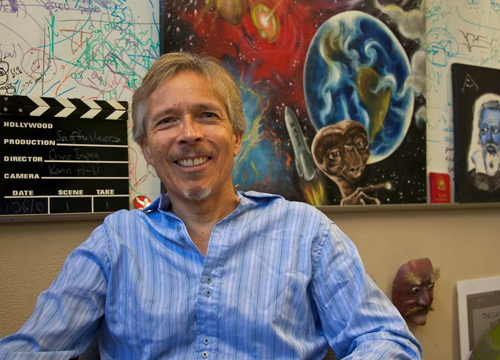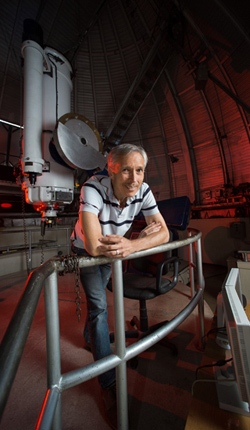Those are the projections of astronomer Chris Impey of the University of Arizona. Impey speculated on the future of space exploration at the February 2015 meeting of the American Association for the Advancement of Science in San Jose. The astronomer specializes in observational cosmology, brilliant quasars and faraway galaxies, but his visions for the next steps in space travel largely remain in the solar system. Impey has published six popular science books, two textbooks and a novel. After his talk, he met with SciCom’s Leigh Cooper to talk about the ethics of space exploration and his new book Beyond: Our Future in Space, set for release in April.
In your book, you say humans are driven to explore space. What is it that drives us?
We obviously are curious. I think it is clearly built into us. Our long history shows that. The next and hardest thing we can do is go [into space] and see what’s beyond—even though we don’t have to.
You talk about the need to explore like it’s built into our genetics.
It’s a more provocative argument, but it’s hard to prove. There does seem to be an identifiable genetic component that correlates with either risk-taking behavior or the inclination to explore. If all the individuals in a community had this attribute, too many of them would get killed or wander off. But in the genetic diversity of a human population, it has pushed envelopes and boundaries in our past and probably will continue to in the future.
Do you think you have the explorer gene?
I have probably been to 60 countries, so I suppose I have it, but not in the sort of extreme, physical-hardship adventure sense.
I just want to know what’s inside a galaxy 8 billion light-years away. There is no reason to need to know that. It’s quite a hard thing to observe, so why would you do it beyond curiosity? It’s curiosity about something very alien, unknown and remote from everyday experiences.
Some of the speakers today discussed whether aliens—if we find them—have rights. Do we have a right or a responsibility to explore the galaxy or should we step back and leave Mars to the Martians?
The community of astronomers divides [on this question]. I have colleagues who say we should treat Mars like a national park. We should appreciate it aesthetically and not alter it. But a preponderance of my colleagues thinks that as long as we’re not wanton or careless, we should be able to explore. We’d clearly be scientifically foolish to contaminate life on Mars by bringing terrestrial microbes. One of my colleagues thinks it’s our duty to seed life on a planet that has no life. He thinks one of our directives as a human species is to spread life through the universe.
And where do you fall?
"If a private, wildcat space cowboy goes out and lassos an asteroid and brings it into Earth’s orbit, who’s actually going to stop him?"
I’m not at either extreme. I guess the only thing I get annoyed by is when people make emphatic, doctrinaire statements about space that they know very well are not applied on Earth. Why would a Martian microbe have rights and privileges when we accord no such rights or privileges to any microbial life form on Earth?
In your book, you delve into how humans will evolve as we move off Earth. Can you talk about that?
Whatever our motivation is for leaving the planet permanently, a base would be self-sustaining where children are born and people live and die. The disconnect with humanity will be fairly rapid culturally—probably within a couple of generations. You will be in such a different environment, and you will develop your own cultural framework. And at some point you will become a new species [because of] the lower gravity on Mars, slightly different air, and the lack of contaminants and pathogens. You’ll look different and function differently, and maybe at some point you won’t be able to mate [with Earthlings].
One of my favorite sets of books to play that out is the red, green, and blue “Mars trilogy” of Kim Stanley Robinson. The trilogy posits a near-but-not-very-near future Mars where colonies exist, and Earth depends on Martian resources. The Mars colonists revolt against the home planet because they really don’t feel like they’re Earthlings anymore. Some of that will happen, too.
We’re talking about a science fiction book right now, but we’re at one of the best science conferences in the world. Why do these sorts of questions need to be discussed now?
Because astronomy and space science are areas where science fiction is turning into science in front of our eyes. Sure, there are some implacable truths and realities based on the laws of physics or the conservation of energy [that limit space travel], so there are things you can and can’t do. We’re not going to have teleportation. We’re not going to have some of the wide-eyed or standard tropes of science fiction for the foreseeable future. But some things have gone faster than we have expected, especially the parts that relate to miniaturization and the parts that leverage the information technology revolution.
Do you think regulations will keep up with this type of science?
No way! And it’s not just regulation. It’s enforcement, too. The Outer Space Treaty [1967] was signed by most U.N. nations. That treaty is the framing document for agreeing not to militarize space and for agreeing that nobody can own anything. But it was telling when the Moon Agreement [1979] was not signed by the main space powers. People started to change their minds. We didn’t really want to tie our hands in that way.
And enforcement is a whole other matter. If a private, wildcat space cowboy goes out and lassos an asteroid and brings it into Earth’s orbit, who’s actually going to stop him?
Two large accidents occurred with private space programs in the past six months: the Orbital Science rocket exploded and then the Virgin Galactic SpaceShipTwo crashed. Are these setbacks detrimental to the space program?
I think they are just part of the process. I was a postdoc at Caltech when the [space shuttle] Challenger blew up. I remember the next morning in a coffee room. The grad students and postdocs were having a very somber discussion. Then someone piped up and said, “OK. Tomorrow a NASA administrator calls and says you can go up in the next shuttle launch for free. Who would go?” Every hand in the room went up. Every one. This is just after seven astronauts died in a horrible way and nobody knew why. That group of people wanted to go up there despite the risks.
[Losses] are going to happen throughout this process. Elon Musk [the CEO of SpaceX] posted that little video of his rocket failing to land on that offshore platform, skittering off to the side and blowing up. He was quite happy because he knows how hard it is to do that. He thinks, “We’re getting there.”
That attitude epitomizes what all these people have going on. They’re in it for the long haul. People are going to die. You are going to lose a lot of expensive hardware.
Tourism sounds like it is going to play a huge part in space travel.
I think it is going to play a role. The market will have a very sturdy high end given the wealth on the planet. And wealth is an emblematic thing. If you want to show off, even your best buddies at the country club can’t say they spent a week on a hotel in orbit. I’m sure it will happen. Moon and Mars tourism will be slower and take longer.
How do you get people or your students to open their minds to the fact that all these advances in space exploration are happening right now?
My 18- to 20-year-old students are deeply embedded in the popular culture. They’re on social media hearing about things, but they’re not usually hearing about this. It only catches their attention occasionally. For instance, the YouTube video where the Canadian astronaut [Chris Hadfield] played that great rendition of “Space Oddity”—[my students] were taken by that. It made it real for them. They think “Wow! That would be the ultimate music experience or food experience or sex experience or whatever.”
When space impinges into the popular culture like that, it opens their eyes. I don’t think young people forget that. It’s in there. It’s become a little meme.
It sounds like younger generations identify differently with space than generations that witnessed the Apollo missions.
It’s different for them. It’s not Neil Armstrong setting foot on the moon. They have to have their own version of space. Maybe it’s Elon Musk because he’s Tony Stark [from "Iron Man"]. I think the heroes are going to be different. It’ll have to be a younger generation of people doing it.
You can’t even be misty-eyed about it. Apollo was, of course, a huge technical and cultural achievement, but it was a geopolitically and militarily motivated event. It wouldn’t have happened otherwise. Why is it less pure if a couple of rappers who are extremely well-heeled are the first two to put an orbiting rap motel in space where they gather their buddies, make good music, and beam it down to Earth? Why isn’t that a worthy thing to do in orbit?
Your “day job” is serious astronomy research. What do you say to undergraduates in your science classes? Why become an astronomer right now?
Astronomy is never going to be the most useful thing you can do with your life, but it could be the most exciting thing. It’s moving at a breakneck pace: exoplanets, dark energy and dark matter, black holes and their properties. All of those fascinating, exotic, bizarre, knotty problems of astrophysics still haven’t been answered. And we’ve got the most amazing set of tools to work on them—the biggest set of telescopes and even bigger ones on the horizon. There are amazing robotic spacecraft trawling the solar system. It’s the golden age for astrophysics.
____________________
© 2015 Leigh Cooper. Probe the writing career of SciCom grad student Leigh Cooper at leighacooper.com.


